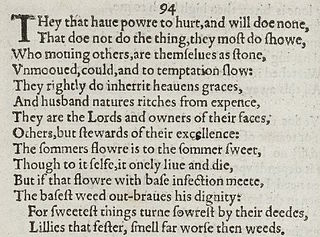
Sonnet 94 is one of 154 sonnets written by the English playwright and poet William Shakespeare. It is a member of the Fair Youth sequence, in which the poet expresses his love towards a young man.

Sonnet 45 is one of 154 sonnets written by the English playwright and poet William Shakespeare. It is a member of the Fair Youth sequence, in which the poet expresses his love towards a young man. Sonnet 45 is continued from Sonnet 44.
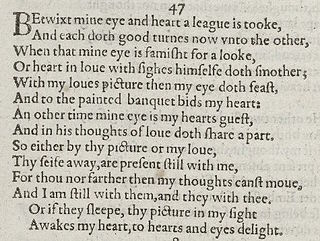
Shakespeare's Sonnet 47 is one of the Fair Youth sequence, addressed to a well-born young man. More locally, it is a thematic continuation of Sonnet 46.
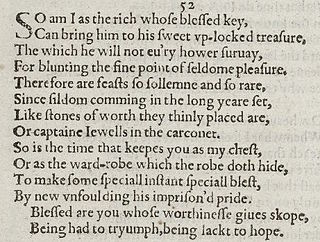
Sonnet 52 is one of 154 sonnets written by the English playwright and poet William Shakespeare. It is a member of the Fair Youth sequence, in which the poet expresses his love towards a young man.

Sonnet 61 is one of 154 sonnets written by the English playwright and poet William Shakespeare. It is a member of the Fair Youth sequence, in which the poet expresses his love towards a young man.

Sonnet 91 is one of 154 sonnets written by the English playwright and poet William Shakespeare. It's a member of the Fair Youth sequence, in which the poet expresses his love towards a young man.
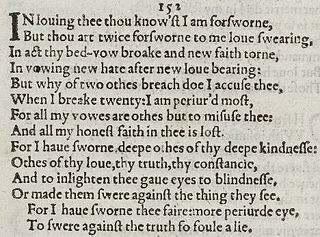
Sonnet 152 is a sonnet by William Shakespeare. It is one of a collection of 154 sonnets, dealing with themes such as the passage of time, love, beauty and mortality, first published in a 1609.
Sonnet 149 is one of 154 sonnets written by the English playwright and poet William Shakespeare.

Sonnet 142 is one of 154 sonnets written by the English playwright and poet William Shakespeare.
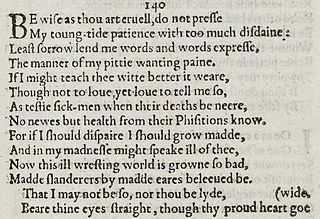
Sonnet 140 is one of 154 sonnets written by the English playwright and poet William Shakespeare. Sonnet 140 is one of the Dark Lady sonnets, in which the poet writes to a mysterious woman who rivals the Fair Youth for the poet's affection.

Sonnet 131 is a sonnet written by William Shakespeare and was first published in a 1609 quarto edition titled Shakespeare's sonnets. It is a part of the Dark Lady sequence, which are addressed to an unknown woman usually assumed to possess a dark complexion.

Sonnet 75 is one of 154 sonnets written by the English playwright and poet William Shakespeare. It is a member of the Fair Youth sequence, in which the poet expresses his love towards a young man.

Sonnet 119 is one of 154 sonnets written by the English playwright and poet William Shakespeare. It's a member of the Fair Youth sequence, in which the poet expresses his love towards a young man.

Sonnet 90 is one of 154 sonnets written by the English playwright and poet William Shakespeare. It is a member of the Fair Youth sequence, in which the poet expresses his love towards a young man.
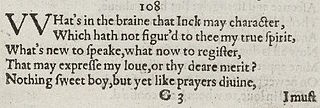
Sonnet 108 is one of 154 sonnets written by the English playwright and poet William Shakespeare. It is a member of the Fair Youth sequence, in which the poet expresses his love towards a young man.

Sonnet 111 is one of 154 sonnets written by the English playwright and poet William Shakespeare. It is a member of the Fair Youth sequence, in which the poet expresses his love towards a young man.
Sonnet 113 is one of 154 sonnets written by the English playwright and poet William Shakespeare. It's a member of the Fair Youth sequence, in which the poet expresses his love towards a young man.

Sonnet 114 is one of 154 sonnets written by the English playwright and poet William Shakespeare. It is a member of the Fair Youth sequence, in which the poet expresses his love towards a young man.

Sonnet 115 is one of 154 sonnets written by the English playwright and poet William Shakespeare. It is a member of the Fair Youth sequence, in which the poet expresses his love towards a young man.

Sonnet 121 is one of 154 sonnets written by the English playwright and poet William Shakespeare. It is a member of the Fair Youth sequence, in which the poet expresses his love towards his young lover.




















